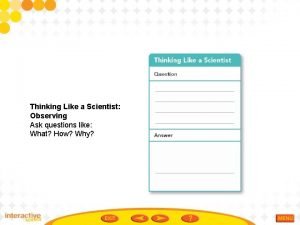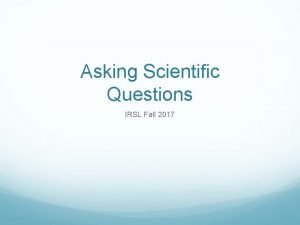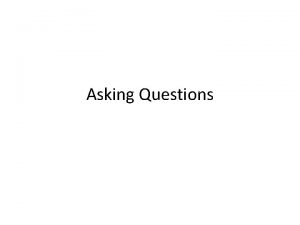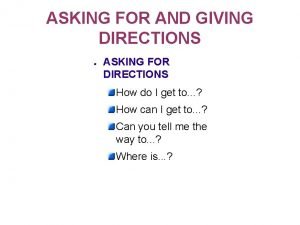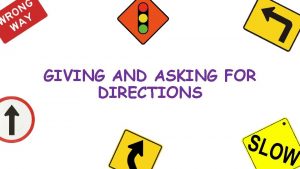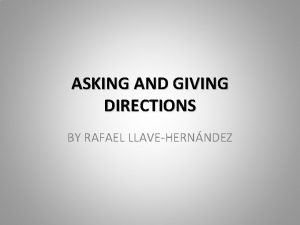Asking Good Philosophical Questions Philosophical Questions A focused












- Slides: 12

Asking Good Philosophical Questions

Philosophical Questions A focused question about something you wonder about (this can include thought processes) Directed towards the universal, not just a particular Should be open to multiple potential answers Asks questions that do not just require scientific observation, historical analysis, or general observation to answer – Goes beyond simply gathering/remembering information

Tips Do not ask rhetorical questions – there should be some way to answer it Try to avoid turning your question into a (thinly) disguised objection Do not ask a question to fill a gap in knowledge – should be perplexing in nature Try to define an abstract concept Go beyond the occasion of your question – How does it related to a universal instance? Have a clear source or reason behind the (conceptual/empirical) puzzle or the textual problem motivating your question

The “right” answer may not be attainable by conducting experiments or surveys, reading up on the topic, doing calculations or consulting experts Does NOT mean every answer is equal Need to determine the better answers by using rules of logic and reasoning Use standards of good reasoning to explore multiple philosophical resolutions A resolution that is well-reasoned, impartial, comprehensive and coherent is better than one that is not Think about other implications – what is the ripple effect of an accepted resolution


In philosophy, a teacher is not looking for terminal answers…. Like a terminal illness, a terminal answer gives you no options…. A good answer is instead like a candle in the dark. It provides both light and mystery. It should, of course, illuminate, while at the same time reveal the contours of the unknown so that the listener can surmise that there is much more to be investigated and learned” - Lipman, Sharp and Oscanyan (1980)

Types of Philosophical Questions Evaluative – Attempts to question societally held value systems ◦ What is right/wrong? ◦ What should we do in various situations? ◦ Value statements – is knowledge valuable? Conceptual – Explores the meaning of various concepts ◦ What is “justice? ” ◦ What is “the self? ” Metaphysical – Questions the nature of reality and what exists ◦ What is real? ◦ What is reality made of?

More Types of Questions Phenomenological – Focuses on personal experiences ◦ What is true freedom like? ◦ Is justice necessary for society to function? Epistemological – Explores the nature of knowledge ◦ How do we know anything? ◦ What is knowledge?

Bad Examples: “How does the brain function when we learn? ” Answered by scientific research “Why is Canada a democracy? ” Answered by historical analysis “What subjects are taught in Australian schools? ” Answered by collecting information “Does student inquiry lead to improved grades? ” Answered through research and observation

Good Examples: “What does it mean to understand something? ” “What obligations do teachers have to their students? ” What makes these good philosophical questions compared to the other ones? Both questions are: Open to interpretation Can have multiple answers depending on a variety of beliefs Are not dependent on simple research/data Require logical justification to answer Even once answered, they can still be contested

Question Activity For each of the following questions: Give the type of question a label/category (You can make up your own) Figure out what you would need/need to do to find an answer? Based on how you could arrive at the answer, make a judgement call. Does it make for a good philosophical question? Why/Why not? If it is NOT a good philosophical question, what would you change to MAKE it a good one?

1. How many kilometers can a car travel on a single tank of gas? 2. What time is it? 3. May I have another cookie? 4. Where are our thoughts located? 5. If a tree falls in the forest and no one is around to hear it, does it make a sound? 6. What kind of people SHOULD we be?
 Good thought good deeds good words
Good thought good deeds good words When is afternoon and evening
When is afternoon and evening Good afternon animado
Good afternon animado If you are
If you are Buenas tardes
Buenas tardes Asking essential questions
Asking essential questions Positive question tags
Positive question tags Present continous exercises
Present continous exercises Asking the right questions chapter 1
Asking the right questions chapter 1 Observing and asking questions
Observing and asking questions How to ask sensitive questions
How to ask sensitive questions Asking scientific questions activity
Asking scientific questions activity You always answer the questions in spanish
You always answer the questions in spanish









